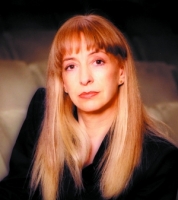Read works of Susan Greenfield at 百家争鸣 | |||
Greenfield is Professor of Synaptic Pharmacology at Lincoln College, Oxford. On 1 February 2006, she was installed as Chancellor of Heriot-Watt University in Edinburgh. Until 8 January 2010, she was director of the Royal Institution of Great Britain, but following a review, she was made redundant.
Early life
Baroness Greenfield was born in the west London borough of Hammersmith to Doris (Thorp) and Myer Reginald Greenfield, a machine operator, whose parents were Austrian and Russian. Greenfield attended the private Godolphin and Latymer School, and was the first member of her family to go on to university, at St Hilda's College, Oxford.
Career
Greenfield's research is focused on brain physiology, particularly the etiology of Parkinson's and Alzheimer's diseases, but she is best known as a populariser of science. Greenfield has written several popular-science books about the brain and consciousness, and regularly gives public lectures, and appears on radio and television.
In 1994, she was invited to be the first woman to give the Royal Institution Christmas Lecture, then sponsored by the BBC. Her lecture was titled "Journey to the centre of the brain". She was appointed Director of the Royal Institution in 1998 and Adelaide's Thinker in Residence for 2004 and 2005. From 1995 to 1999, she gave public lectures as Gresham Professor of Physic.
Greenfield created three research and biotechnology companies: Synaptica, BrainBoost, and Neurodiagnostics, which research neuronal diseases such as Alzheimer's disease. She is a Patron of Dignity in Dying and a founder and trustee of the charity Science for Humanity, a network of scientists, researchers and technologists that collaborates with non-profits to create practical solutions to the everyday problems of developing communities. The idea of matching scientific capability with the needs of poor communities came to her while writing Tomorrow's People, a book in which she imagined a future world of "techno haves and techno have-nots". She felt that the democratization and dissemination of science through organizations like Science for Humanity was a way to avoid such a future.
Political affiliation
Baroness Greenfield sits in the United Kingdom Parliament in the House of Lords as a crossbencher, having no formal political affiliation. Records of Baroness Greenfield's activity in the House of Lords indicate abstention on a range of issues.
Award
As well as several honorary degrees
, Greenfield has been awarded the Royal Society's Michael Faraday Prize, and in January 2000, received the CBE for her contribution to the public understanding of science. Dimbleby Lecturer 1999. Hon Australian of the Year 2006. She is a Patron of the Alzheimer's Research Trust. In 2003, she was appointed a Chevalier Légion d'Honneur by the French Government, and in June 2001, she was created a Life Peer, as Baroness Greenfield, of Ot Moor in the County of Oxfordshire.
Controversy
Greenfield has expressed concerns that modern technology, and in particular social networking sites, may have a negative impact on child development.
In this respect, she has been criticised by Ben Goldacre for claiming that technology has adverse effects on the human brain, without having undertaken any research or properly evaluating available evidence. Goldacre called on her to "[formally] write up her concerns about computers damaging childrens' brains", to which she replied that he is "like the people who denied that smoking caused cancer".
Personal life
Greenfield was married to an Oxford University Professor of Physical Chemistry, Peter Atkins; they divorced in 2005.

